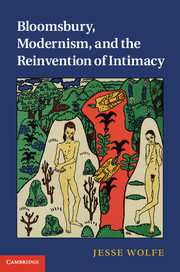Book contents
- Frontmatter
- Contents
- List of figures
- List of tables
- Acknowledgments
- Introduction: narrating Bloomsbury
- PART I PHILOSOPHICAL BACKGROUNDS
- PART II DEFEATED HUSBANDS
- PART III DOMESTIC ANGELS
- 5 Woolf's sane woman in the attic
- 6 A return to essences
- Conclusion: the prescience of the two Bloomsburies
- Appendix
- Notes
- Bibliography
- Index
6 - A return to essences
from PART III - DOMESTIC ANGELS
Published online by Cambridge University Press: 05 December 2011
- Frontmatter
- Contents
- List of figures
- List of tables
- Acknowledgments
- Introduction: narrating Bloomsbury
- PART I PHILOSOPHICAL BACKGROUNDS
- PART II DEFEATED HUSBANDS
- PART III DOMESTIC ANGELS
- 5 Woolf's sane woman in the attic
- 6 A return to essences
- Conclusion: the prescience of the two Bloomsburies
- Appendix
- Notes
- Bibliography
- Index
Summary
The essentialism in Howards End (1910) – its retrenchment in Victorian gender roles and its skeptical, even unfriendly attitude toward androgynous Soul-material – is perplexing, given Bloomsbury's politics as a group, Forster's biography, and the array of “intermediates” in Forster's other novels. Bloomsbury's œuvre, frequently recognizable for embracing androgyny and critiquing ideals such as female angelic domesticity, is rendered less harmonious, but ultimately richer, by the presence of such dissonant notes as this retrenchment.
A similar essentialism – perplexing, and also anomalous among its author's works – colors the pages of Vita Sackville-West's 1931 All Passion Spent. As in Howards End, the conservative handling of gender in All Passion Spent counteracts its vigorous rejection of Victorian marriage, which is consistent with the BBC radio broadcasts that Sackville-West and her husband Harold Nicolson did at this time, on the topic of female independence. Having exposed, in narrative form, the limitations that such a matrimonial paradigm imposes on the wife, why not rethink the masculine and feminine Soul-material from which different domestic partnerships might be constituted in the coming decades? In her life Sackville-West did so, and other of her works (like others of Forster's) do so, but All Passion Spent (like Howards End) only begins to do so, before slipping back into more familiar psychological contours.
The paradox of this retrenchment is deepened because All Passion Spent pays meticulous tribute to Mrs Dalloway, a novel as remarkable as any Bloomsburian writing for the rigor of its sexual anti-essentialism.
- Type
- Chapter
- Information
- Bloomsbury, Modernism, and the Reinvention of Intimacy , pp. 164 - 191Publisher: Cambridge University PressPrint publication year: 2011



